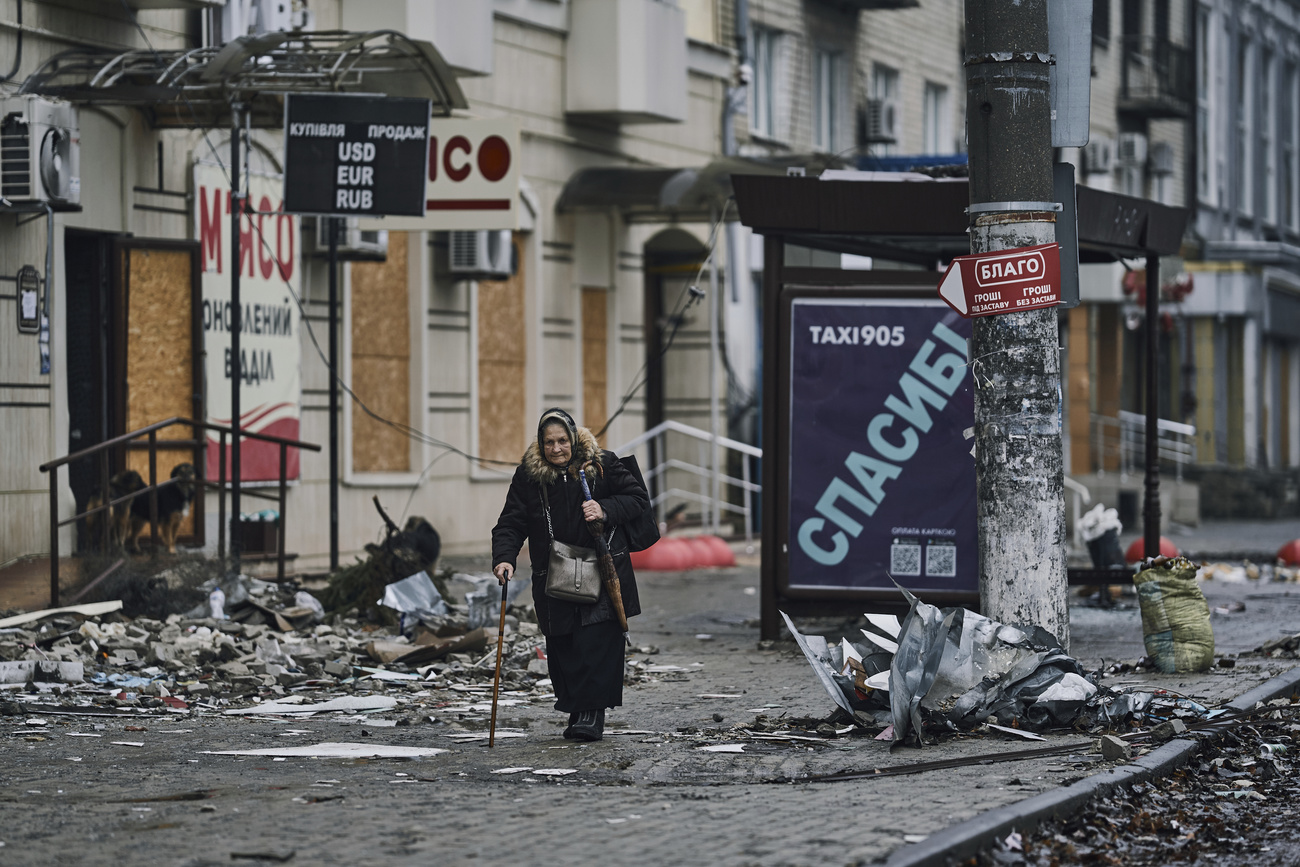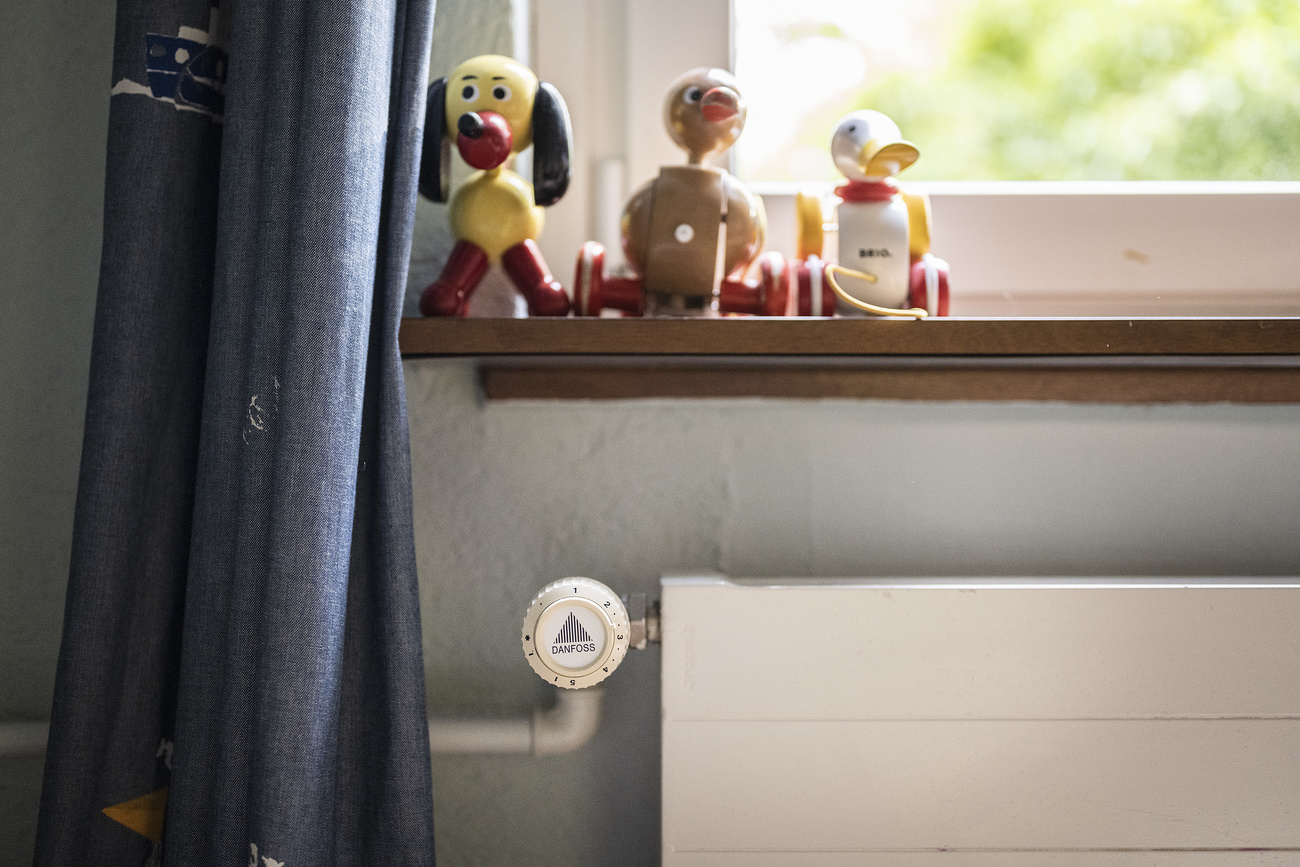
How the war in Ukraine has changed Switzerland

From confiscating Russian private assets to abandoning neutrality – the war in Ukraine has forced Switzerland to consider the previously unthinkable. But how realistic is change in the steadfast Alpine nation? An analysis and five forecasts.
Russian assets
Switzerland has yet to seize any Russian assets that could be used for the reconstruction of Ukraine. But the country is under mounting pressure both at home and abroad to do so. This is reflected in the gradual change in tone and tune of politicians. For example, during the World Economic Forum (WEF) in January, Swiss Foreign Minister Ignazio Cassis declared that frozen Russian assets “could possibly be used to rebuild Ukraine.” He did include an important caveat by noting this would require a legal basis and international cooperation.
Vague as that statement was, it was enough to trigger jitters in the Swiss financial center. Just six months earlier, the same Cassis, who represents the centre-right Radical Liberal Party in the Federal Council, had vehemently warned against expropriation. It would be a “dangerous precedent,” he said during the Ukraine Recovery Conference in the Swiss town of Lugano.
That shift in rhetoric makes two things clear. First, Switzerland will not lead the way. That’s not particularly surprising in a country that has been traditionally protective of its financial sector. Switzerland hesitated on sanctions against Russia before eventually following the European Union’s lead. The war in Ukraine has proven a delicate balancing act for Switzerland. On the one hand, it does not want to upset the US and Europe. On the other, it wants to uphold its reputation as a safe destination for the world’s assets, beyond the reach of arbitrary measures.
Second, a move to freeze Russian funds would not be in line with Swiss law. The right to ownership is enshrined in the Swiss constitution. Swiss legal experts say that there is no legal basis to use private frozen Russian funds to rebuild Ukraine. That view was recently confirmed by a high-level working group headed by the Federal Office of Justice.

More
Could Switzerland seize Russia’s foreign reserves for Ukraine reconstruction?
But to be fair, other Western countries have not rushed to freeze Russian assets either. So far, only Canada and Croatia have announced that they would use private Russian funds for Ukraine’s reconstruction. Other countries are still discussing the issue. Ukraine is not the only country putting pressure. Eastern European countries and the US have also urged Switzerland to do so; although it remains to be seen whether Washington will still back such far-reaching confiscations now that Republicans control the House of Representatives.
Switzerland has been in the spotlight of this debate due to the massive sums of money Russian oligarchs stashed away in Swiss accounts. According to the Swiss Bankers Association, Swiss banks hold between CHF150 billion and CHF200 billion ($160-$214 billion) in assets that belong to Russian clients. So far, some CHF7.5 billion and 17 Russian-owned properties have been seized. By comparison €19 billion (CHF19 billion) of Russian assets have been frozen in the entire EU.
The Russian central bank also uses Swiss bank accounts. A fact sheet from Switzerland’s State Secretariat for International Financial Matters states that up to 2% of Russian central bank funds are in Switzerland. Even though the money is not officially frozen it cannot be transferred. Some legal experts have expressed the opinion that a legal basis for confiscation is most likely to emerge or be invented for these funds.
Forecast: If Switzerland ever dares to confiscate Russian funds – a scenario that appears increasingly likely – it will only do so if a legal pathway is found at the international level.
Swiss arms industry
Switzerland has not endeared itself to Western countries with its ban on the re-export of war materiel. The most prominent example of this was when Switzerland refused to send ammunition for the German Gepard tanks to help the war effort in Ukraine. It also rejected similar requests from Spain and Denmark.
Germany’s decision to restart the production of ammunition for Gepard tanks on its own soil triggered in Switzerland a discussion about the future of the Swiss arms industry. The defence industry’s contribution to the overall economy is negligible. It accounts for only 2.5% of the annual turnover of the entire metal, electrical and machine (MEM) industry.

More
Will Switzerland ever join NATO?
But the Swiss arms industry conducts considerable lobbying. Its most powerful argument: without exports the Swiss arms industry would struggle to survive in its current size for economic reasons. This would hurt Switzerland’s self-sufficiency when it comes to weapons and compromise in turn the principle of armed neutrality. It is a logic that resonates strongly with the national-conservative swing of Swiss politics, which is protective of the industry.
The Federal Law on War Material (FLMG), which was tightened last year, prohibits the re-export of Swiss war material to war zones from third countries. For years, parties on the left and in the center of the political spectrum have put pressure on the Swiss arms industry. Russia’s war on Ukraine turned debates over this restriction even more heated. Even those in left-wing parties are having second thoughts.
Forecast: At one point it appeared almost certain that Switzerland will budge on the issue. At the federal level, two political proposals are pending to create a corresponding legal basis. One proposes allowing the re-export of war materiel for a limited period and only in the context of the Ukraine conflict. The other provides for general relaxation of the rules within the parameters of international law. In other words, Switzerland would only re-export weapons if the United Nations Security Council or two-thirds of the UN General Assembly agree that the conflict in question violates international law. In the case of Russia’s war on Ukraine, the General Assembly has already decided this is the case.
But support for such proposals appears to have been waning in the Swiss parliament in recent days. Whether there will be enough support to secure a majority hinges on the Social Democrats and not least on the question of how the new “peace movement” initiated by German left-wing intellectuals will resonate in Switzerland.
The key question is whether legal reform in Switzerland can move fast enough to help Ukraine. Swiss democratic processes are anything but swift and many are getting impatient. Politicians of various stripes are already under discussion. One idea is for Switzerland to sell back old tanks to the manufacturer in Germany, which is which is legally possible without restrictions. Germany could then make the tanks available to countries that have in turn supplied tanks to Ukraine, thus replenishing their own stocks.
Neutrality
The international community applauded Switzerland when it finally decided to join EU sanctions against Russia at the end of February 2022. This may have had something to do with the fact that it took longer to reach a decision. But above all, the reactions demonstrated that Swiss neutrality is not understood abroad. Sanctions have been part of Swiss foreign policy since the 1990s.
It is important to note that Switzerland interprets neutrality in military terms rather than as a universal principle. Simply put, it does not take part in armed conflicts and does not supply weapons to warring parties. That approach is enshrined in the 1907 The Hague Convention, which Switzerland still considers legally binding.
There have a few exceptions in Swiss history when the Convention was not upheld. This was the case during WWII and the Cold War. But they are considered isolated incidents. In the view of some experts, an amendment to the Federal Law on War Material – effectively allowing indirect arms deliveries to Ukraine – would mark the beginning of the end of Swiss neutrality.
International law expert Oliver Diggelmann of the University of Zurich recently said in an interview with the German-speaking TagesAnzeiger daily: “It would not be an un-Swiss way (…) We would act as if we did not know that this is not permitted under the law of neutrality. And in this way, we could cushion the international pressure.”
Forecast: The right-wing Swiss People’s Party is currently collecting signatures for an initiative that aims to anchor “perpetual and armed neutrality” in the country’s constitution. It is very likely that the party will gather the 100,000 signatures needed to prompt a nationwide vote. A yes vote at the ballot box, however, is less certain. More likely is a return to the previous practice – i.e., to the claim that Swiss neutrality is untouched, while it is interpreted according to need in the event of a crisis.
Refugees
In 2022, Switzerland saw the largest influx of refugees since World War II. The systems providing shelter and care are at their limit. Around 75,000 people, mainly women and children, have arrived from Ukraine. The number of asylum seekers from other countries has also increased after stalling during the Covid-19 pandemic. Around 24,000 applications were submitted in 2022, and the trend is rising.
Switzerland granted refugees from Ukraine protection status S, allowing them to work and lead as normal a live as possible. Many Ukrainian families were initially accommodated privately. Not everything went smoothly. But, so far, public perception on how the country has handled things is positive, according to multiple media reports.
There are problems, however, such as integration into the labour market. Despite the high level of education of the Ukrainian refugees, only 15% have found a job. Swiss classrooms are short on teachers. There is also increasing criticism of the accommodation provided to refugees. Some cantons have had to resort to emergency solutions.
Forecast: With general elections on the horizon, immigration will be on voters’ minds. That plays into the hands of the anti-immigration Swiss People’s Party. But so far, the issue has not gained much political traction. In the local Zurich elections, which are considered a yardstick for Swiss politics, the Swiss People’s Party only made minor gains.
Energy
Concerns about Switzerland’s energy security dominated the headlines in the summer and autumn. The government launched a campaign calling on people to save energy as shortages were expected. But it kept its demands small and simple, encouraging people to shower instead of taking a bath, for example.
A mild autumn and several European interventions such as importing liquified gas from overseas averted the looming energy crisis. Russian President Vladimir Putin’s gas embargo was a lot less effective than expected. The issue moved to the backburner in Switzerland like in much of Europe.

More
Fact check: will the Swiss be jailed for heating their homes above 19°C?
What remains are long-term effects such as new supply chains for natural gas, a boom in the heat pump industry and, above all, higher living costs. Electricity prices in Switzerland have risen considerably, and this is reflected in consumption. Although inflation is lower than in the European environment, it was still an unusual 3.3% for Switzerland in January. Some parties are taking advantage of the situation to question Switzerland’s nuclear phase-out and its timetable.
Forecast: Switzerland will not experience a new nuclear boom like other countries. Inflation will be absorbed by employers’ wage measures in a labour market that has dried up and is characterised by a shortage of skilled workers. There is no threat of social unrest. Since the price of electricity is rising with a delay, the energy issue will gain in importance again in domestic politics.
Translated from German by Billi Bierling
More

In compliance with the JTI standards
More: SWI swissinfo.ch certified by the Journalism Trust Initiative















![The four-metre-long painting "Sonntag der Bergbauern" [Sunday of the Mountain Farmers, 1923-24/26] had to be removed by a crane from the German Chancellery in Berlin for the exhibition in Bern.](https://www.swissinfo.ch/content/wp-content/uploads/sites/13/2025/12/01_Pressebild_KirchnerxKirchner.jpg?ver=f05a5a9c)
















You can find an overview of ongoing debates with our journalists here . Please join us!
If you want to start a conversation about a topic raised in this article or want to report factual errors, email us at english@swissinfo.ch.